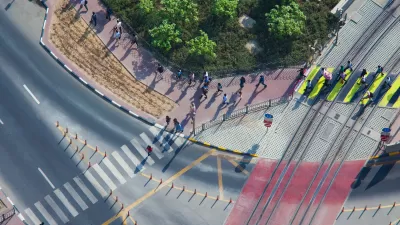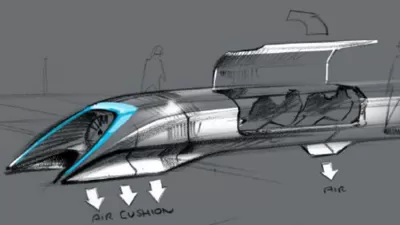Robert Wright describes the policy shift already underway in planning for cities of the future. He reports that "as energy becomes more expensive, cities will have to be much more compact, easier to navigate by bike and on foot."
Masdar, a new planned city set at the edge of Abu Dhabi and designed by Foster + Partners will be an example of this new planning method. Tasked with creating a metropolis that would produce neither carbon emissions nor waste, the design team studied how Arabia's centuries-old traditional cities allowed residents to cope with their environment's intense heat without air conditioning or cars.
"The transport systems envisaged for Masdar, as the city will be known, draw as heavily on the past as on the designs of the buildings. The shade provided by its narrow streets and short distances will encourage walking and cycling."
But this policy shift is not universally upheld. Alan Pisarski, author of the long-running Commuting in America series of books, believes that "increasing prosperity and the growing specialization of many jobs will lead commuters to travel still further. And only the car, he argues, will have the range and flexibility necessary."
Andy Southern, managing director for the planning division of Atkins, the design and engineering consultancy, says it will be hard for car-centric cities such as Dubai to move towards more human-scale development. "If you already have a city that has a large sprawl and massive highways built for car dependency and long commuting trips," he says, "it is going to take a long time to change that, not just from a transport point of view but also from an urban form and planning point of view."
FULL STORY: Policy Shift: Cities Invest In Public Transport

Alabama: Trump Terminates Settlements for Black Communities Harmed By Raw Sewage
Trump deemed the landmark civil rights agreement “illegal DEI and environmental justice policy.”

Study: Maui’s Plan to Convert Vacation Rentals to Long-Term Housing Could Cause Nearly $1 Billion Economic Loss
The plan would reduce visitor accommodation by 25% resulting in 1,900 jobs lost.

Why Should We Subsidize Public Transportation?
Many public transit agencies face financial stress due to rising costs, declining fare revenue, and declining subsidies. Transit advocates must provide a strong business case for increasing public transit funding.

Wind Energy on the Rise Despite Federal Policy Reversal
The Trump administration is revoking federal support for renewable energy, but demand for new projects continues unabated.

Passengers Flock to Caltrain After Electrification
The new electric trains are running faster and more reliably, leading to strong ridership growth on the Bay Area rail system.

Texas Churches Rally Behind ‘Yes in God’s Back Yard’ Legislation
Religious leaders want the state to reduce zoning regulations to streamline leasing church-owned land to housing developers.
Urban Design for Planners 1: Software Tools
This six-course series explores essential urban design concepts using open source software and equips planners with the tools they need to participate fully in the urban design process.
Planning for Universal Design
Learn the tools for implementing Universal Design in planning regulations.
Caltrans
Smith Gee Studio
Institute for Housing and Urban Development Studies (IHS)
City of Grandview
Harvard GSD Executive Education
Toledo-Lucas County Plan Commissions
Salt Lake City
NYU Wagner Graduate School of Public Service




























